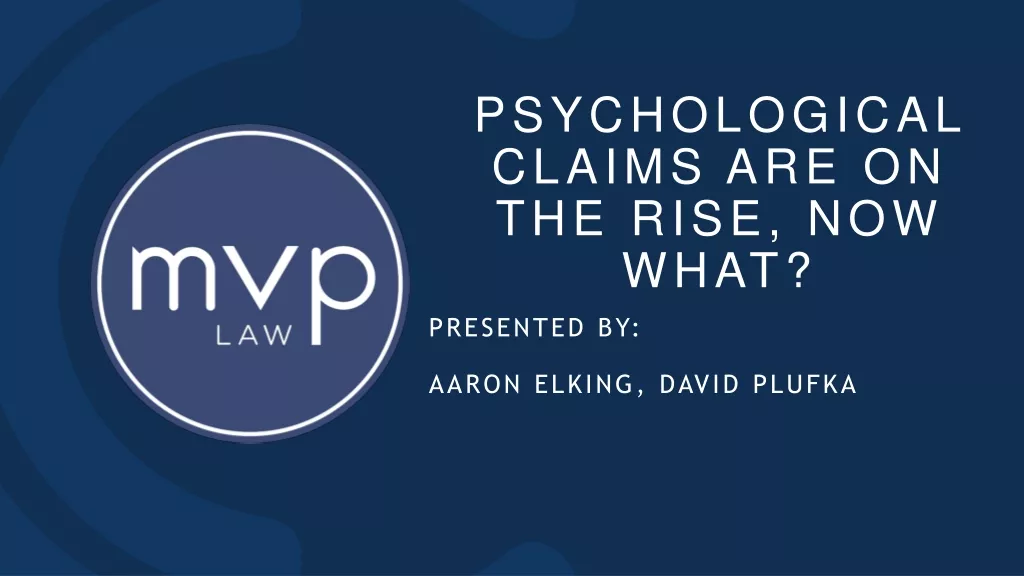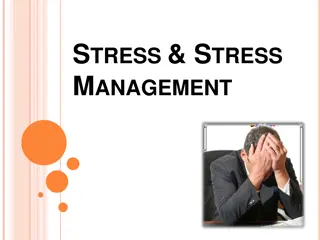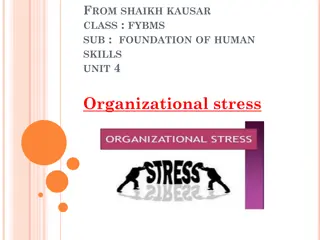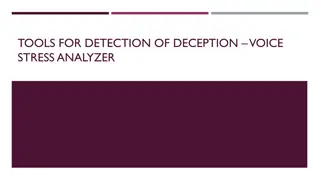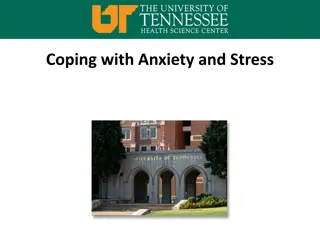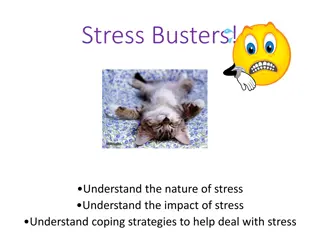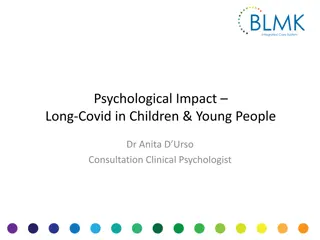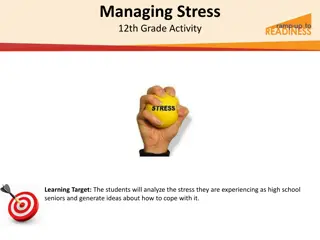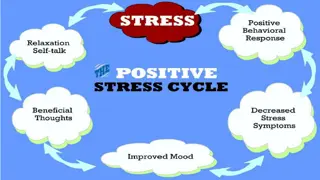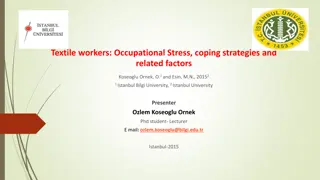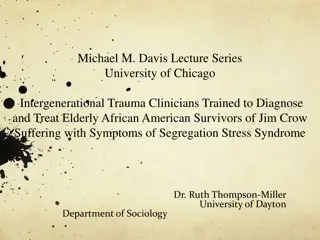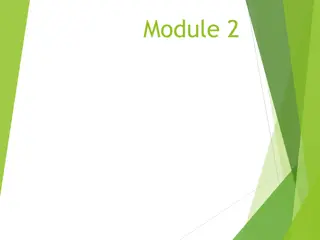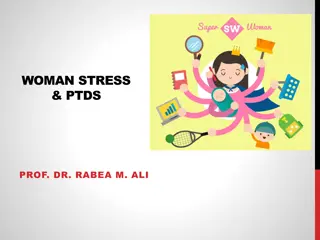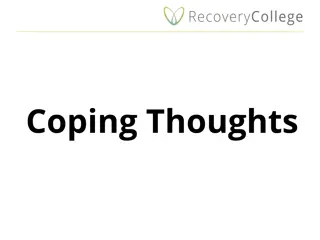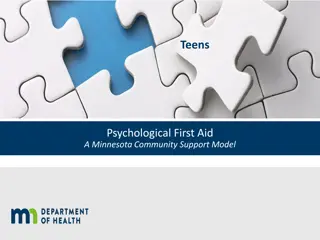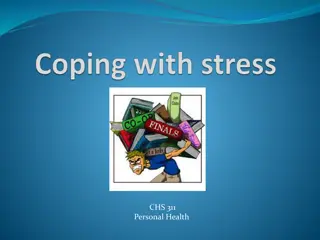Psychological Stress: Effects and Coping Strategies
Psychological stress can have both positive (eustress) and negative (distress) impacts on individuals. It can lead to physical and mental health issues if not managed effectively. Common stressors include relationship conflicts, work responsibilities, financial strain, and traumatic incidents. Recognizing the signs of chronic stress is crucial for addressing and coping with its effects.
Download Presentation

Please find below an Image/Link to download the presentation.
The content on the website is provided AS IS for your information and personal use only. It may not be sold, licensed, or shared on other websites without obtaining consent from the author.If you encounter any issues during the download, it is possible that the publisher has removed the file from their server.
You are allowed to download the files provided on this website for personal or commercial use, subject to the condition that they are used lawfully. All files are the property of their respective owners.
The content on the website is provided AS IS for your information and personal use only. It may not be sold, licensed, or shared on other websites without obtaining consent from the author.
E N D
Presentation Transcript
B.A. PART I (H) 05TH MAY 2020 KUMARI RANJEETA GUEST FACULTY M. L. ARYA COLLEGE, DEPTT. OF PSYCHOLOGY E-mail- bkranjeeta@gmail.com Mb. No.- 8969020842
05 MAY 2020 B.A. PART I (H) PAPER III, UNIT II (STRESS PROBLEM OF ADJUSTMENT) PSYCHOLOGICAL LEVEL OF STRESS There s a good chance we can all identify negative stress, but did you know that stress can also be positive? Good stress, called eustress, can actually be beneficial to you. Unlike bad stress, or distress, good stress can help with motivation, focus, energy, and performance. For some people, it can also feel exciting. On the other hand, bad stress typically causes anxiety, concern, and a decrease in performance. It also feels uncomfortable, and it can lead to more serious issues if not addressed.
05 MAY 2020 B.A. PART I (H) PAPER III, UNIT II (STRESS PROBLEM OF ADJUSTMENT) Psychological stress effects It s no secret that the long-term effects of distress can damage our health Trusted Sources. Stress has the ability to negatively impact our lives. It can cause physical conditions, such as headaches, digestive issues, and sleep disturbances. It can also cause psychological and emotional strains, including confusion, anxiety, and depression. According to the American Psychological Association, untreated chronic stress, or stress that s constant and lasts over an extended period of time, can result in high blood pressure or a weakened immune system.
05 MAY 2020 B.A. PART I (H) PAPER III, UNIT II (STRESS PROBLEM OF ADJUSTMENT) It can also contribute to the development of obesity Trusted Sourceand heart disease. Psychological stress signs There s a distinction between a stressor and actual stress. A stressorcan be a person, place, or situation that s causing you stress. Stress is the actual response to one or a combination of those stressors. There are any number of situations that can cause stress. Dr. Gary Brown, a licensed psychotherapist, says some of the more common stressors include:
05 MAY 2020 B.A. PART I (H) PAPER III, UNIT II (STRESS PROBLEM OF ADJUSTMENT) relationship conflicts at home new or increasing work responsibilities increasing demands financial strain loss of a loved one health problems moving to a new location exposure to one or more traumatic incidents, such as a car accident or a violent crime
05 MAY 2020 B.A. PART I (H) PAPER III, UNIT II (STRESS PROBLEM OF ADJUSTMENT) Some of the more common physical, psychological, and emotional signs of chronic stress include: rapid heart rate elevated blood pressure feeling overwhelmed fatigue difficulty sleeping poor problem-solving fear that the stressor won t go away
05 MAY 2020 B.A. PART I (H) PAPER III, UNIT II (STRESS PROBLEM OF ADJUSTMENT) persistent thoughts about one or more stressors changes in behavior, including social withdrawal, feelings of sadness, frustration, loss of emotional control, inability to rest, and self-medication In summary, some of the psychological and emotional signs that you're stressed out include: Depression or anxiety. Anger, irritability, or restlessness. Feeling overwhelmed, unmotivated, or unfocused. It can cause physical conditions, such as headaches, digestive issues, and sleep disturbances. It can also cause psychological and emotional strains, including confusion, anxiety, and depression
05 MAY 2020 B.A. PART I (H) PAPER III, UNIT II (STRESS PROBLEM OF ADJUSTMENT) Some of the psychological and emotional signs that you're stressed out include: Depression or anxiety. Anger, irritability, or restlessness. Feeling overwhelmed, unmotivated, or unfocused. Trouble sleeping or sleeping too much. Racing thoughts or constant worry. Problems with your memory or concentration. Making bad decisions.


